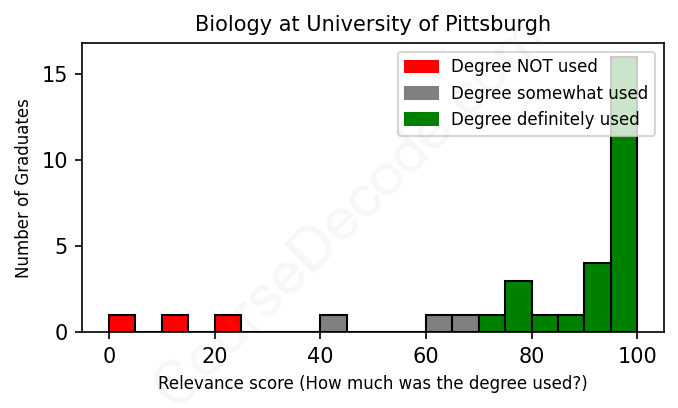
First, some facts. Of the Biology graduates from University of Pittsburgh we've analyzed , here's how many have used (or NOT used) their degree in their career:

These are estimates based on AI analysis of 32 LinkedIn profiles (see below).
The verdict? Significantly above average. Overall, with an average relevance score of 82%, Biology graduates from University of Pittsburgh have a much higher likelihood (+15%) of finding work in this field compared to the average graduate across all fields:
And for comparison, here's the chart for all profiles we've looked at across all degrees.
Also, after graduating, 68% of these graduates have pursued further education other than another Bachelor's degree (such as a Masters degree or other), compared to the average across all profiles of 35%. This suggests you may need more than just a Bachelors degree to be competitive as a Biology graduate.
See the details:
|
Relevance score: 100% We think this person has gone into a career highly relevant to their degree. We think this person has gone into a career highly relevant to their degree.
DEGREE INFOGraduated in 2020 from University of Pittsburgh with a Bachelor's degree in Biology. Also pursued further education since (see below). JOB HISTORY SINCE GRADUATIONBiostatistician Massachusetts General Hospital Nov 2021 - Present FURTHER DEGREES DONE SINCE GRADUATINGMaster of Science - MSNorthwestern University 2020 - 2021 ABOUTNo information provided. |
The top 10 most common jobs done by the graduates we've analyzed (ranked most common to least) are:
Here is a visual representation of the most common words in job titles for Biology graduates (this is across all Biology graduates we've analyzed, not just those who went to University of Pittsburgh):

When it comes to graduates from the University of Pittsburgh with a degree in Biology, there’s a pretty clear trend in career trajectories, especially in the health and medical fields. Most of these folks seem to kick things off with entry-level jobs that are highly relevant to biology and healthcare, like research technicians, medical assistants, or physical therapy aides. This makes sense since their education equips them with a solid foundation for roles that dive deeper into biology and health sciences. For instance, you’ve got graduates moving into roles like physical therapists, physicians, and even specialist surgeons within a few short years after graduation. This indicates a strong pipeline into advanced medical careers, which is super encouraging for anyone thinking about a career in health or biological sciences.
Fast forward five or ten years, and many graduates have indeed progressed to impressive positions within their fields. We see them taking on roles like family physicians, physical therapy residents, and even academic positions like assistant professors. However, there’s also a mix of graduates who have ventured into less traditional paths, like tech roles at Amazon or managerial positions in healthcare settings that don’t directly involve biology. While some may have taken a detour from their original biology-focused careers, it shows the versatility of a biology degree—alumni aren't just confined to lab settings or hospitals! All in all, it looks like the majority of these grads have found successful strides in relevant fields, though a few have branched out into different domains entirely. So, if you’re eyeing a biology degree, it seems like there are really good options waiting for you after you graduate!
Pursuing a Bachelor’s degree in Biology at the University of Pittsburgh can be a pretty challenging experience, but it really depends on your interests and study habits. The coursework is typically rigorous, with a lot of emphasis on lab work, complex concepts, and analytical thinking. If you’ve got a solid background in science and enjoy diving deep into subjects like genetics or ecology, you might find it relatable, but if science isn't your thing, it could definitely feel overwhelming at times. It's not necessarily harder than other major programs, but be prepared for some tough classes and lots of studying! Overall, if you’re passionate about biology and ready to put in the effort, you can definitely handle it.
Most commonly, in the LinkedIn profiles we've looked at, it takes people 4 years to finish a Bachelor degree in Biology.
Honestly, looking at these graduates from the University of Pittsburgh, it seems like they’ve carved out some pretty decent financial paths for themselves. The ones pursuing healthcare careers, like physicians and physical therapists, generally have good earning potentials right out of school or after a few years of residency. Even those in research or more niche jobs seem to land roles in reputable institutions, which is a solid sign of stability, even if the starting salaries might not be as high. There are a few who have taken a creative or non-traditional route, like museum educators and researchers, which might not bring in as much dough, but they’re still working in significant roles. Overall, it looks like most of these grads are doing well enough to make a living, and many are on track to earn even more as they gain experience.
Here is a visual representation of the most common words seen in the "about" section of LinkedIn profiles who have a Bachelor degree in Biology (this is across all Biology graduates we've analyzed, not just those who went to University of Pittsburgh). This may or may not be useful:

Here are all colleges offering a Bachelor degree in Biology (ordered by the average relevance score of their Biology graduates, best to worst) where we have analyzed at least 10 of their graduates: